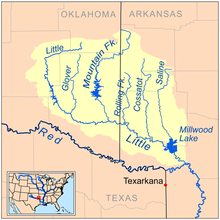Cossatot River
| Cossatot River | |
|---|---|

The Cossatot River near Gillham Lake in Howard County, Arkansas
|
|

The Little River watershed
|
|
| Basin features | |
| Main source |
Ouachita Mountains 34°28′52″N 94°11′37″W / 34.48122°N 94.19354°W |
| River mouth |
Gillham Lake, Howard County, Arkansas 33°47′28″N 94°09′15″W / 33.79123°N 94.15408°WCoordinates: 33°47′28″N 94°09′15″W / 33.79123°N 94.15408°W |
The Cossatot River is an 89-mile-long (143 km) river in the U.S. state Arkansas.
Cossatot comes from an Indian term which translates roughly to skull crusher. The Cossatot is known as a difficult (class II - IV+) whitewater stream to canoeists and kayakers and a section at Cossatot Falls in Howard County, Arkansas has been called "the most challenging section of whitewater between the Smokies and the Rockies," though there are many more challenging runs in the state of Arkansas, such as Richland Creek, Crooked Creek or the Upper Buffalo (Hailstone run). An 11-mile (18-km) section including Cossatot Falls is designated as the Cossatot River State Park-Natural Area. Cossatot Falls is a series of back-to-back class III-IV+ rapids that drops around 40 feet in 1/8 of a mile. Rapid names are Cossatosser (class II+), Eye Opener, B.M.F. (class III), Washing Machine (class IV+), Whiplash, (class III+), and Shoulderbone (class II), with Deer Camp Rapid (class III), Devil's Hollow Rapid (class III+), and Devil's Hollow Falls (class IV) located downstream of the Falls area. Zigzag (Class III) and the Esses (class III) are other notable rapids on the Cossatot, located above the Falls. Whitewater rapid classes vary depending on water level. At certain higher levels near flood state, almost all of the Cossatot Falls turn into one long rapid.
The Cossatot begins in the Ouachita Mountains southeast of Mena, Arkansas. The river flows through the Ouachita National Forest and then in a generally southerly direction until it empties into Gillham Lake. After exiting Gillham Lake the river becomes leisurely until it joins with the Little River at the site where it empties into Millwood Lake.
The World War II fleet oiler USS Cossatot (AO-77) is named after this river.
...
Wikipedia
